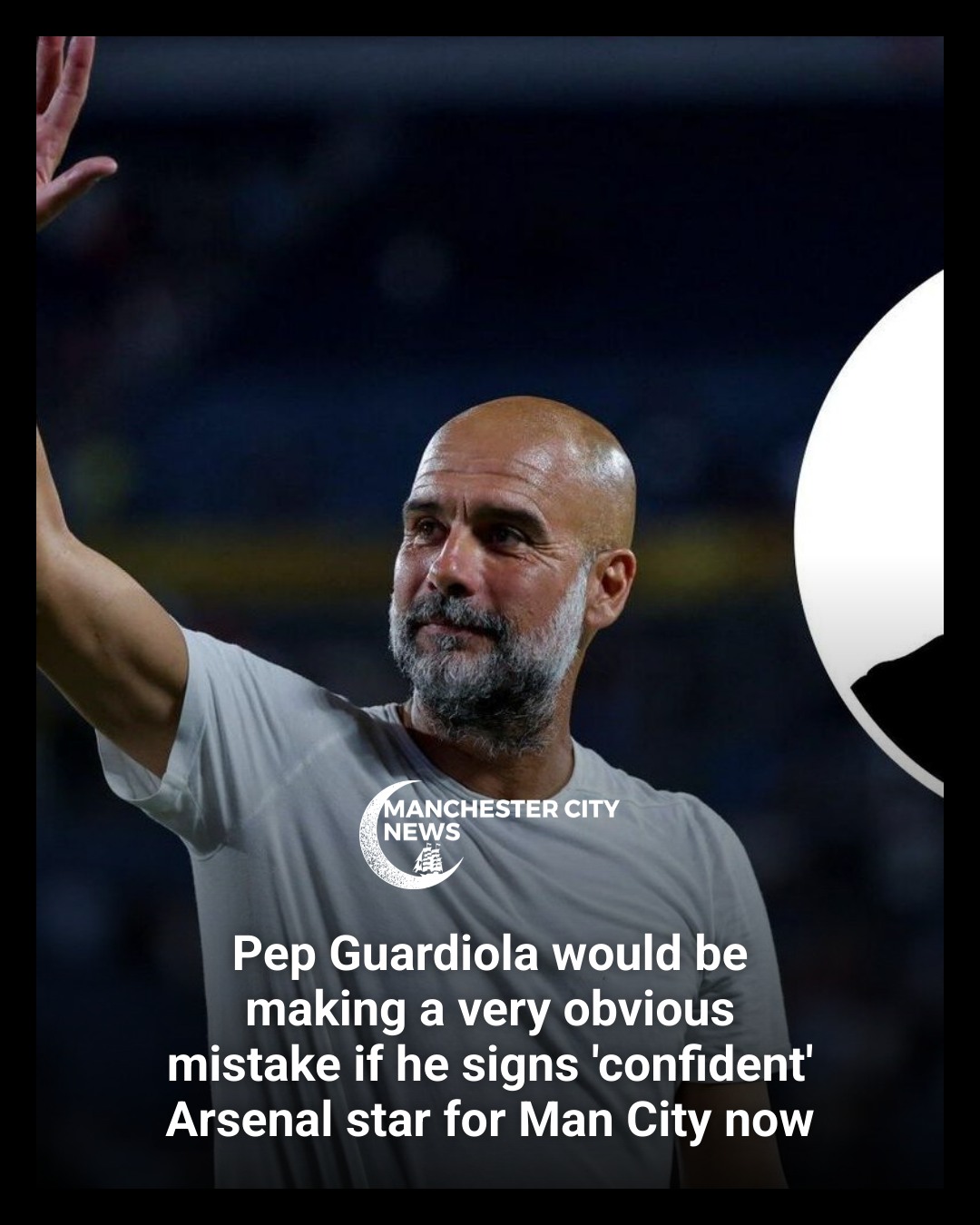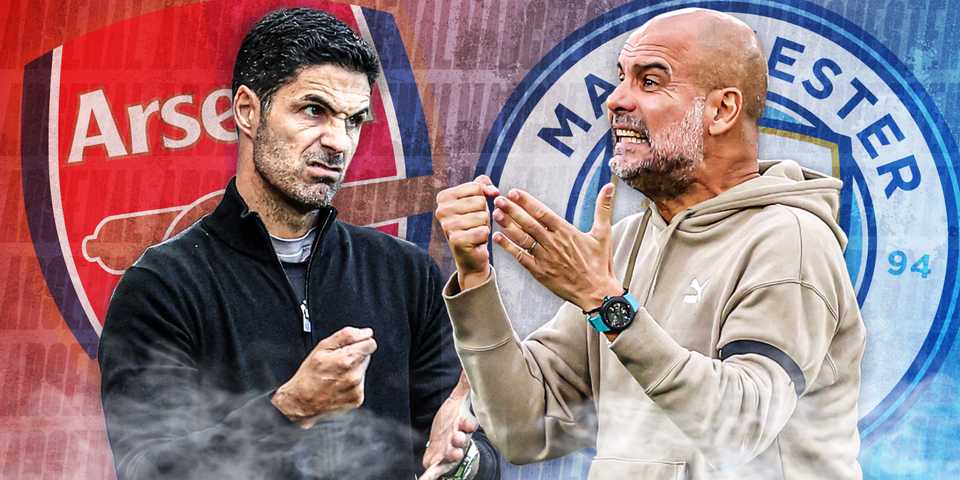Manchester City’s Interest in Ethan Nwaneri: A Strategic Analysis of Why Guardiola Should Avoid Arsenal’s Rising Star

Manchester City’s relentless pursuit of excellence continues to dominate the summer transfer landscape, with Pep Guardiola’s side remaining one of the most active clubs in the market despite having already secured four significant additions to their squad. The Premier League giants have demonstrated their characteristic ambition and strategic planning throughout the 2025 transfer window, but their work is far from complete as they prepare for what promises to be another demanding campaign across multiple competitions.
The Citizens entered the summer transfer period with clear intentions following what can only be described as a challenging 2024/25 campaign by their historically high standards. The disappointment of that season has served as a catalyst for significant changes, with Guardiola determined to ensure that such setbacks do not occur again. The legendary Spanish coach has approached the transfer market with renewed vigor, understanding that continuous evolution and squad enhancement are essential for maintaining City’s position at the pinnacle of world football.
The club’s commitment to improvement has been evident in their swift action during the early stages of the transfer window. Before embarking on their FIFA Club World Cup campaign, City had already secured four new stars, demonstrating their ability to identify targets, negotiate deals, and complete transfers efficiently. This proactive approach reflects the club’s sophisticated transfer strategy and their understanding that early business often provides the best value and allows for proper integration of new players.
The Current State of City’s Squad Planning
While Manchester City’s first-team squad is currently enjoying a well-deserved break until the end of July, the club’s hierarchy and coaching staff have maintained their focus on squad development and strategic planning. The summer holidays for players provide the perfect opportunity for the club’s decision-makers to assess the current squad composition, identify areas for improvement, and execute the necessary changes to ensure competitiveness across all competitions.
The ongoing transfer activity behind the scenes at the Manchester club reflects their comprehensive approach to squad building. City’s interest in securing a right-back demonstrates their attention to positional balance and depth, recognizing that success in modern football requires quality options in every area of the pitch. The club’s ability to identify specific positional needs and target appropriate players speaks to their sophisticated scouting network and tactical analysis.
Equally important to City’s summer strategy is the need to manage squad size and financial compliance through player departures. Several players remain on the transfer list, with the club working diligently to find suitable destinations for those who may not feature prominently in Guardiola’s plans for the upcoming season. This delicate balance between incoming and outgoing transfers requires careful coordination and strategic thinking to ensure that the squad remains both competitive and financially sustainable.
Ethan Nwaneri: A Rising Star in North London
The emergence of Ethan Nwaneri as one of English football’s most promising young talents has captured the attention of clubs across the Premier League and beyond. At just 18 years old, the versatile midfielder has already demonstrated the kind of technical ability, tactical intelligence, and mental fortitude that suggests a bright future in the game. His development at Arsenal has been nothing short of remarkable, with the youngster consistently impressing whenever given opportunities to showcase his abilities.
Nwaneri’s journey through Arsenal’s academy system has been characterized by rapid progression and significant milestones. His ability to adapt to different tactical systems and positional requirements has made him a valuable asset for the Gunners, while his maturity and composure on the ball have impressed coaches and teammates alike. The teenager’s versatility allows him to operate in multiple positions across the midfield, providing tactical flexibility that is increasingly valued in modern football.
The young midfielder’s technical proficiency is complemented by his excellent decision-making and spatial awareness, attributes that have enabled him to make seamless transitions between youth and senior football. His performances have consistently demonstrated a level of understanding and execution that belies his age, suggesting that he possesses the mental attributes necessary to succeed at the highest level of professional football.
The Contract Situation and Transfer Speculation
Nwaneri’s current contract situation at Arsenal has created an intriguing subplot in the ongoing transfer window. With his existing deal set to expire in 2026, the youngster finds himself in a position where he can influence his future by making specific demands regarding his development and playing opportunities. His desire for guaranteed game time before committing to a new contract at the Emirates Stadium reflects the confidence and ambition that have characterized his rapid rise through the ranks.
The contractual standoff between Nwaneri and Arsenal highlights the challenges that modern clubs face in retaining their most promising young talents. In an era where players are increasingly aware of their market value and career trajectory, young stars are more willing to make demands and consider alternative options if they feel their development may be compromised. This shift in player mentality has created more competitive transfer markets for young talents and has forced clubs to provide clearer pathways to first-team football.
Arsenal’s hierarchy faces a delicate balancing act in their negotiations with Nwaneri. The club recognizes his exceptional potential and is keen to secure his long-term future, but they must also consider the broader implications of guaranteeing playing time to any player, regardless of their promise. The decisions made in these negotiations will not only affect Nwaneri’s career but could also set precedents for how the club handles similar situations with other young talents.
Chelsea’s Pursuit and Romano’s Insights
According to transfer specialist Fabrizio Romano, Chelsea have emerged as the frontrunners for Nwaneri’s signature should he decide to leave Arsenal. The Blues’ interest in the teenager reflects their continued commitment to acquiring young talents and their belief in his potential to contribute to their long-term success. Chelsea’s track record of developing young players and providing pathways to first-team football makes them an attractive destination for promising talents like Nwaneri.
Romano’s reporting suggests that Chelsea’s interest is contingent on Nwaneri’s failure to agree new terms with Arsenal, indicating that the West London club is prepared to capitalize on any contractual disputes. This opportunistic approach has become characteristic of modern transfer markets, where clubs constantly monitor situations at rival clubs and position themselves to benefit from any instability or disagreement.
The reported interest from Chelsea adds another layer of complexity to Nwaneri’s situation. The prospect of moving to a club with a proven track record of developing young players and providing first-team opportunities may be tempting for the teenager, particularly if he feels that his development at Arsenal may be hindered by limited playing time. Chelsea’s recent history of integrating academy graduates into their first team could provide the kind of assurance that Nwaneri is seeking.
Manchester City’s Historical Interest
Manchester City’s interest in Nwaneri is not a recent development, with reports suggesting that Pep Guardiola has been monitoring the player’s progress for some time. The Spanish coach’s reputation for identifying and developing young talents makes City’s interest in Nwaneri unsurprising, particularly given the teenager’s technical attributes and tactical versatility. Guardiola’s track record of working with young players and helping them reach their full potential has made City an attractive destination for promising talents.
The Daily Mail’s reporting of City’s long-standing interest in Nwaneri provides context for understanding why the club might consider making a move for the teenager. Guardiola’s appreciation for technically gifted players who can adapt to different tactical systems aligns perfectly with Nwaneri’s skill set and development profile. The coach’s ability to improve players and maximize their potential has been a consistent theme throughout his career, making him an appealing figure for young talents seeking to advance their careers.
City’s interest in Nwaneri also reflects their broader strategy of identifying and acquiring the best young talents before they become established stars. This approach has served the club well in previous transfer windows, allowing them to secure players who subsequently develop into key contributors. The club’s financial resources and competitive success provide them with significant advantages in attracting young talents, even when competing against other elite clubs.
Mikel Arteta’s Admiration and Strategic Importance
Mikel Arteta’s public praise for Nwaneri provides valuable insight into the teenager’s character and potential. The Arsenal manager’s comments following Nwaneri’s goal on his first Champions League start highlight the qualities that make the youngster so highly regarded. Arteta’s observation about Nwaneri’s aggressive approach to the game and his ability to make the right choices in crucial moments demonstrates the kind of mentality that is essential for success at the highest level.
The Spanish coach’s description of Nwaneri as “composed, calm and confident in his ability” paints a picture of a player who possesses the mental attributes necessary to thrive in high-pressure situations. These psychological qualities are often the difference between promising young players who fulfill their potential and those who fall short of expectations. Arteta’s assessment suggests that Nwaneri possesses the mental fortitude required to succeed in elite football.
The significance of Nwaneri scoring an important goal in the Champions League at just 17 years old cannot be understated. Such achievements are rare and typically indicate that a player possesses exceptional ability and mental strength. Arteta’s recognition of this accomplishment and his emphasis on the teenager’s fearless approach to the game suggest that Arsenal view Nwaneri as a potential cornerstone of their future success.
The Strategic Argument Against Signing Nwaneri
Despite the obvious talent and potential that Nwaneri possesses, there are compelling arguments for why Manchester City should avoid pursuing the teenager at this time. The primary concern revolves around squad balance and the immediate needs of Guardiola’s team. While Nwaneri undoubtedly represents a promising long-term investment, City’s current priorities may be better served by focusing on more immediate requirements.
The club’s existing midfield options provide significant depth and quality, with established players occupying key positions and contributing to the team’s success. Adding another young midfielder to this mix, regardless of his potential, may not address the specific tactical needs that Guardiola has identified for the upcoming season. The coach’s preference for working with a smaller, more focused squad could make the addition of Nwaneri counterproductive to the team’s overall balance.
Furthermore, the financial implications of pursuing Nwaneri must be considered in the context of City’s broader transfer strategy. The resources required to secure his signature could be better allocated to addressing more pressing positional needs or acquiring players who can make immediate contributions to the team’s success. The club’s financial fair play considerations also require careful management of transfer expenditure and squad investments.
The Development Pathway Challenge
One of the most significant challenges facing Manchester City in their potential pursuit of Nwaneri relates to providing adequate development opportunities for the teenager. The club’s current squad depth and quality mean that breaking into the first team requires exceptional ability and performance levels. Young players joining City must be prepared to compete with established international stars for playing time, which can be a daunting prospect even for the most promising talents.
The example of other young players who have joined City in recent years provides valuable context for understanding the challenges that Nwaneri might face. While the club has an excellent track record of developing young talents, the pathway to first-team football has become increasingly competitive as the club has continued to strengthen its squad with world-class acquisitions. This reality means that even exceptionally talented young players may struggle to secure regular playing time.
The loan system that City employs for young player development, while effective in many cases, may not provide the kind of immediate first-team opportunities that Nwaneri is seeking. The teenager’s demands for guaranteed playing time suggest that he is looking for a more direct pathway to regular football, which may be difficult to provide at a club with City’s depth and ambition.
Alternative Strategic Considerations
Rather than pursuing Nwaneri, Manchester City’s resources and attention might be better directed toward addressing more immediate squad needs. The club’s reported interest in securing a right-back, for example, represents a more pressing requirement that could have a more direct impact on the team’s performance in the upcoming season. Focusing on specific positional needs rather than opportunistic signings may provide better value and strategic benefits.
The club’s ongoing efforts to manage squad size and optimize team chemistry could also be compromised by adding another young player who may not immediately contribute to the first team. Guardiola’s preference for working with a cohesive group of players who understand their roles and responsibilities might be better served by focusing on quality rather than quantity in the transfer market.
Additionally, the potential disruption that could result from pursuing a player from a direct Premier League rival must be considered. The relationship between clubs can be affected by transfer activities, and City may prefer to maintain positive relationships with other Premier League clubs rather than risk complications through aggressive pursuit of their players.
The Broader Transfer Market Context
The 2025 summer transfer window has been characterized by intense competition for the most promising young talents, with clubs across Europe recognizing the importance of securing future stars before they become established players. This competitive environment has driven up prices and made it increasingly difficult for clubs to secure their preferred targets without significant financial investments.
Manchester City’s position in this market is complicated by their success and reputation, which makes them an attractive destination for players but also increases expectations and pressure on new signings. Young players joining City must be prepared to contribute immediately or face the prospect of limited opportunities, which may not align with the development timelines that are typically associated with teenage prospects.
The club’s recent transfer activity has demonstrated their ability to identify and secure high-quality additions to their squad, but it has also highlighted the importance of strategic planning and careful consideration of each signing’s potential impact. The decision regarding Nwaneri must be evaluated in the context of these broader strategic considerations and the club’s long-term objectives.
Financial and Regulatory Considerations
The financial landscape of modern football continues to evolve, with clubs facing increasing scrutiny regarding their transfer activities and squad investments. Manchester City’s approach to the transfer market must balance their competitive ambitions with the need to comply with financial fair play regulations and maintain sustainable business practices.
The cost of securing Nwaneri’s signature, combined with the ongoing expenses associated with maintaining a large squad, must be carefully evaluated against the potential benefits of adding the teenager to the team. The club’s financial planning requires consideration of both immediate costs and long-term implications, including potential future transfer values and contractual obligations.
The regulatory environment surrounding player transfers and squad composition continues to evolve, with authorities implementing new rules and guidelines that affect how clubs can operate in the transfer market. City’s decision-making process must account for these regulatory considerations and ensure that any transfer activity complies with current and anticipated future requirements.
Conclusion: A Strategic Decision Point
The question of whether Manchester City should pursue Ethan Nwaneri represents a fascinating case study in modern transfer strategy and squad management. While the teenager’s talent and potential are undeniable, the strategic arguments against signing him at this time appear compelling when considered in the context of City’s broader objectives and current squad composition.
Guardiola’s focus on maintaining squad balance and addressing specific tactical needs suggests that resources might be better allocated to more immediate requirements. The club’s success has been built on strategic decision-making and careful consideration of each signing’s potential impact, principles that should guide their approach to the Nwaneri situation.
The complexity of modern football transfer markets requires clubs to balance multiple considerations, including talent acquisition, squad management, financial sustainability, and strategic planning. Manchester City’s approach to the Nwaneri situation will provide valuable insights into how elite clubs navigate these challenges while maintaining their competitive edge.
Ultimately, the decision regarding Nwaneri will depend on City’s assessment of their current needs, future objectives, and the teenager’s potential contribution to their success. While avoiding the signing may seem counterintuitive given his obvious talent, it may represent the kind of strategic discipline that has contributed to City’s sustained success under Guardiola’s leadership.















